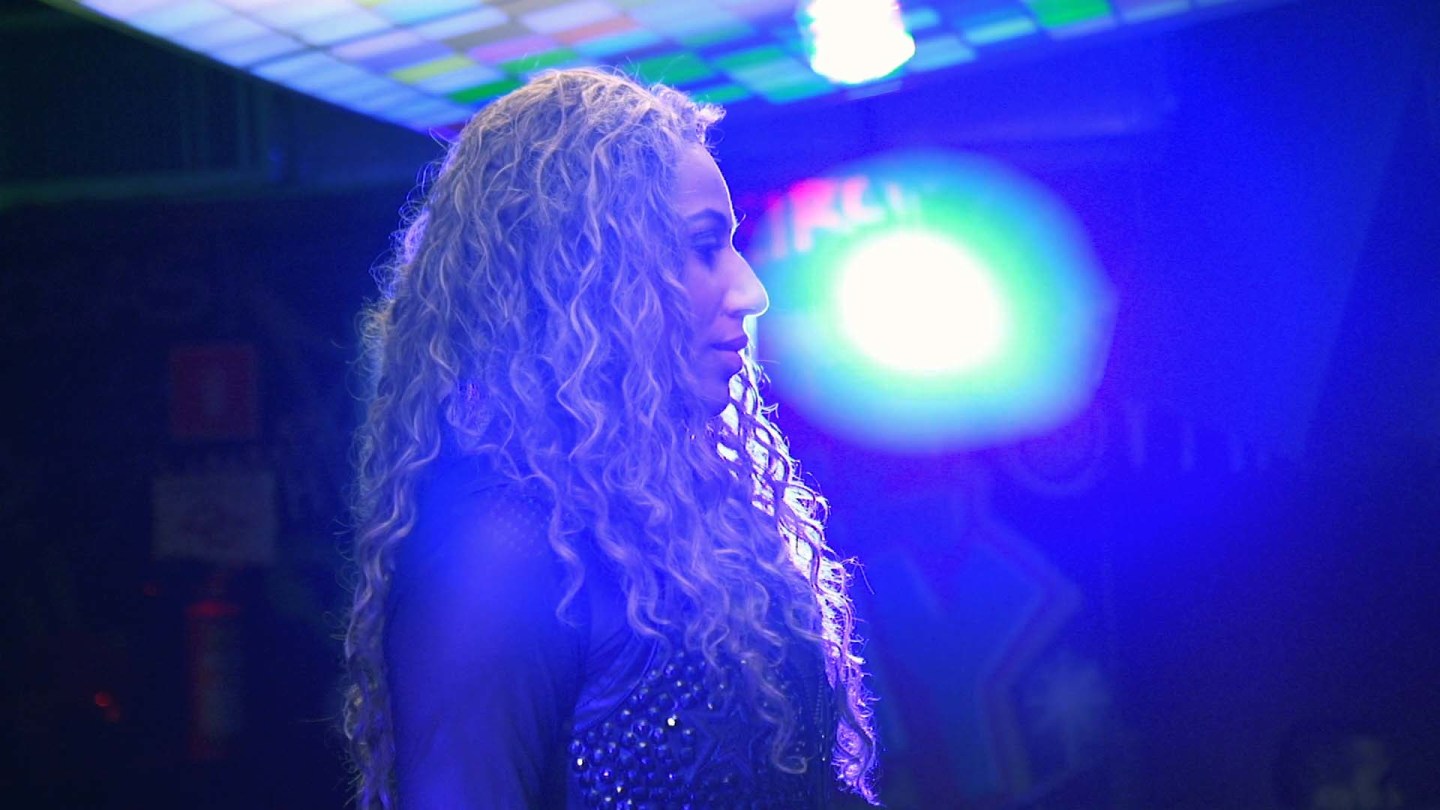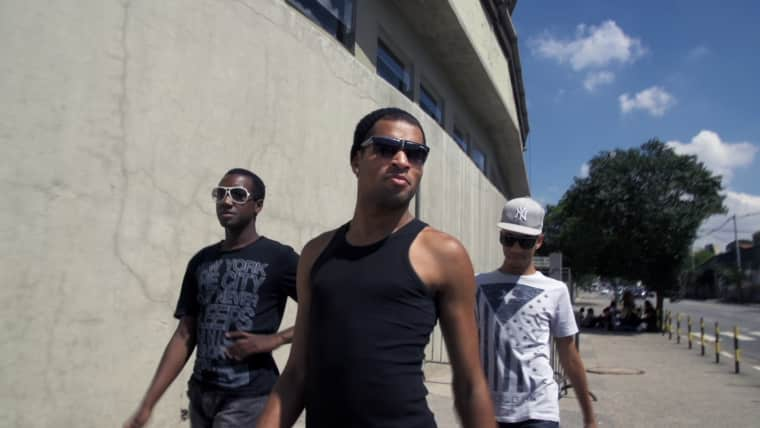 Gabriela Electra, a professional Beyoncé impersonator, performs in the documentary Waiting For B.
BFI Flare
Gabriela Electra, a professional Beyoncé impersonator, performs in the documentary Waiting For B.
BFI Flare
Halfway through the 2016 documentary Waiting For B., a young Brazilian man named Jefferson Coelho is shown mid-transformation. “In the hetero world, I think I suffer more from being gay…in the gay world, I suffer prejudice from being black,” he says, while a friend applies shimmering make-up to his face in a bare São Paulo apartment. Later that evening Jefferson emerges in full drag as his alter-ego, Melina McLean, strutting along a dusty highway beside São Paulo’s Arena Corinthians stadium in heels, wig, and mini dress.
Brazil can be a prohibitively violent place for queer and trans folk to live openly, with over 1600 LGBTQ people killed in hate-motivated attacks between 2012 and 2016. But there is space for free expression in the camp site outside the stadium, where dozens of poor queer kids have pitched tents for two months to make sure that, when doors open, they can secure the best view of a show from the greatest performer on earth: Beyoncé.
Waiting For B. is directed by São Paulo-based duo Abigail Spindel and Paulo Cesar Toledo, and gives an intimate portrait of a handful of Beyoncé’s most marginalized fans in the lead-up to the Brazil leg of her 2013 Mrs. Carter Show World Tour. Clusters of tents outside the stadium are inhabited by strangers who will become family as they pass time perfecting the choreography to “Grown Woman,” squabbling, and talking romance and racism. The doc reveals what queer fans around the world get from Beyoncé — the space and permission to be bolder and freer than white heteronormative society allows. Ahead of the film’s U.K. premiere at BFI Flare film festival, The FADER spoke with Spindel and Toledo over Skype to learn more about the making of Waiting For B., and what they learned from spending two months with the BeyHive.
What did you know about Beyoncé and her fandom before starting this project, and what made you want to delve deeper into that world?
ABIGAIL SPINDEL: I’m an American, so I’ve been swimming in Beyoncé [laughs]. I assumed she would have fans like any other star. But I thought, There’s something behind this, there’s some other reason why they’re camping out to get to the front, because they’re obviously receiving something from each other in the process. And that’s what happened.
In the film, you get a huge sense of the tight-knit community between fans. How welcoming were they to you, as outsiders? Was it easy to capture authentic footage?
ABIGAIL SPINDEL: When we first arrived, they did that 'show and tell' thing, but we just kept on coming and making friends. The way we work is just by being there and hanging out with a camera. They didn’t take us very seriously, because we don’t appear serious. That’s part of our strategy. So I think that’s why we were absorbed into it like observers.
PAULO CESAR TOLEDO: They thought that performing to the camera was the best way to document their experiences. But what we wanted was for them to ignore us. It took a few trips until we became old news, and they stopped paying attention to our camera. That’s when we got the stuff that we were looking for — really getting into the intimacy of the experience. But it was always in the back of their heads, you know, “What if this really becomes a movie? What if Beyoncé sees this and she’ll know I exist?” So there was always that little bit of faith for them.
And you were giving them a voice that they may not have had without you, in a way.
PAULO CESAR TOLEDO: Definitely. It’s an opportunity to show how they actually are. They’re very aware of how much prejudice they face for so many different reasons: for being gay, for being black, for being poor. And even camping out is something people don’t see very positively here. People scream, throw stuff, they call them bums. An opportunity to show that they are real people who are just really passionate about something is always welcome.
 Vítor Lopes (center), a Brazilian Beyoncé fan in the documentary Waiting For B.
BFI Flare
Vítor Lopes (center), a Brazilian Beyoncé fan in the documentary Waiting For B.
BFI Flare
 Charles Angels dressed and ready to attend Beyoncé's Mrs. Carter Show, in the documentary Waiting For B.
BFI Flare
Charles Angels dressed and ready to attend Beyoncé's Mrs. Carter Show, in the documentary Waiting For B.
BFI Flare
The subjects of the film were almost all LGBTQ, and mostly of color. What does identifying in this way mean for young people in Brazil?
PAULO CESAR TOLEDO: Brazil is a very homophobic country. The whole world is living through this conservative wave, so it’s becoming more homophobic. Brazil also has the highest rate of transgender murders in the world. So being gay in Brazil [involves] a lot of struggle. It’s also a very racist society. When you watch Brazilian TV you’d think you’re in Sweden because everybody is white and blonde, but half of Brazil’s population is non-white.
Then there’s the fact that they are poor. These kids certainly went to public school [but] public education in Brazil is a total disaster, so they are kind of screwed from the get go. There are so many reasons why they should be resentful of society.
There was a moment in the film when three muscular white dudes walk past the camp, which illustrates what you’re saying about the image of Brazil, versus its reality.
PAULO CESAR TOLEDO: It’s a good moment. It’s the two sides of the society facing each other. You have all these gay poor kids, but in that moment they are the majority. So they can harass [the jocks], jokingly of course.
How did spending time with them affect you?
ABIGAIL SPINDEL: As a cold-hearted American who moved here five years ago, the kids gave me a vision outside of my own tendency toward depression. The vibrancy of their youth and their energy inspired me profoundly.
PAULO CESAR TOLEDO: I admired their courage. The fact that they have to face involuntarily so many layers of prejudice, and still face it with humor, focusing on the collective and the positive. They’ve found a way of expressing their frustrations and dreams in a positive way.
What do you think Waiting For B. says about celebrity culture?
ABIGAIL SPINDEL: I think it’s weird that you go out and celebrate an individual by becoming part of a collective. There’s something very religious in it. Beyoncé offers herself for worship. And we, the Catholic culture of Brazilian society, are here to worship her. She makes a [statement]; we make a response. We worship her because she has arranged her persona in a way that we 100% agree with. It’s a submission, yet in that there is empowerment.
PAULO CESAR TOLEDO: I cannot explain the Brazilian fascination with celebrities, but I know it’s intense. Brazilians are also really active on the internet. And there’s this whole ‘Come to Brazil’ culture too. I think that’s about wanting to adore someone and be part of this collective. Brazil offers so few opportunities to poor black youth that basking in the glory of a super successful pop star is one way of feeling like you’re more successful yourself.
Waiting For B. screens at London’s BFI Flare on March 17 and 18.
